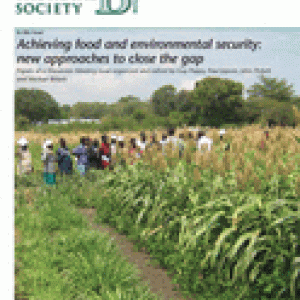
This paper reviews one aspect of the food sustainability challenge: the goal of producing more food – a goal that is unthinkingly accepted by some and vigorously contested by others. The paper argues that increased food production is necessary but also emphasises that this alone, as a response to the challenge, is not sufficient.
The objective of increasing production needs to be constrained by and linked with other, equally important goals. First, increasing production, and indeed maintaining current levels of production must be achieved with less impact on the environment. Hence, we must not ‘intensify’ production but rather ‘sustainably intensify’ production. Second, the goal of increased production must not dominate the food sustainability agenda. Actions to modify population growth and resource intensive consumption patterns, to improve systems of governance, and reduce waste are policy goals that must be pursued equally vigorously.
The paper is thus about the need for, the place of, and the challenges posed by sustainable intensification (SI). It begins by reviews the challenges facing (and caused by) the food system in coming years. It then describes the rationale underlying calls for SI, and where it sits within the broader suite of necessary responses. Next, and taking as its basis the observation that if SI were so easy it would have been done years ago, it explores the trade offs that inevitably arise, focusing in particular on three areas of concern: biodiversity and land use, animal welfare and human nutrition. Finally it offers some conclusions.
Abstract
The coming decades are likely to see increasing pressures on the global food system, both on the demand side from increasing population and per capita consumption, and on the supply side from greater competition for inputs and from climate change. This paper argues that the magnitude of the challenge is such that action is needed throughout the food system, on moderating demand, reducing waste, improving governance and producing more food. It discusses in detail the last component, arguing that more food should be produced using sustainable intensification (SI) strategies, and explores the rationale behind, and meaning of, this term. It also investigates how SI may interact with other food policy agendas, in particular, land use and biodiversity, animal welfare and human nutrition.
Citation
Godfray HCJ., Garnett T., 2014, Food security and sustainable intensification, Phil. Trans. R. Soc. B, doi: 10.1098/rstb.2012.0273



Post a new comment »